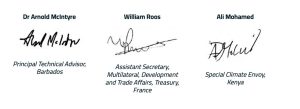Foreword from the Sherpas of the Co-Chairs
When our heads of state and government formed the Global Solidarity Levies Task Force, the aim was clear: by COP30, promote the implementation of global solidarity levies as an innovative source of finance to support the delivery of climate and development goals in developing and vulnerable countries.
The case for solidarity levies is even more pressing and essential now, as it did when the Task Force began at COP28 in November 2023. Financing gaps for sustainable development are large and growing. A lack of affordable finance is widespread in developing countries. There is a critical gap facing concessional financing, which is simply vital for many development priorities, especially related to climate change and its impacts, but also other threats such as pandemics. The best and quickest way today to increase concessional financing significantly in the short term is through levies. This case is now clear, and progress is feasible, even against geopolitical headwinds.
The Task Force has made significant progress on this agenda since its inception. We have explored a wide range of options for potential solidarity levies, covering sectors of the economy that are polluting, under-taxed or which have benefited significantly from globalization without paying back. We have undertaken in-depth technical analysis examining how we can design solidarity levies in a fair, equitable and progressive manner, ensuring a minimal impact on households and businesses while maximizing the impact the revenues can have for climate and development.
Many of the options outlined in our progress report published at COP29 are strong ideas. On one of these proposals, we have already moved forward. The agreement at the International Maritime Organization on an economic element for decarbonizing shipping that will deliver a degree of financing to support a just and equitable transition is an important step in the right direction. Now is the time to go further and the natural next step is to look at aviation. A coalition of the willing can act quickly to implement highly progressive levies targeted at premium flyers and private jets with limited economic impacts while creating a sizeable revenue stream. Ten years after the Paris Agreement and twenty years after the first airplane ticket solidarity levy, COP30 is an opportunity to deliver tangible progress.
Other areas have raised significant interest, such as a levy on either fossil fuel extraction or profits, and a financial transactions tax, as the public consultation showed. Novel ideas are also gaining traction, such as cryptocurrencies which have a significant environmental footprint and have quickly become a major market asset. The Task Force will continue to work together to advance action on all these options and report back by COP30.
Equally important to the design of levies is how the revenues from them are used and distributed. A significant share of the proceeds, whether used domestically and/or globally, will be used to fund resilience and risk mitigation expenditures, ensuring an increase in domestic resource mobilization as a predictable financing source (in particular with regards to climate change mitigation and adaptation, pandemics and other development challenges), and with the possibility to use parts of the proceeds through international solidarity and partnerships.
We are now only a few months away from the deadline in Belém. The Task Force remains determined in its mission. We are grateful to count on a number of strong and committed partners working alongside us, such as the World Bank, IMF, UN, OECD, UNCTAD, G24, V20/CVF, Green Climate Fund, the Coalition of Finance Ministers for Climate Action, and more recently UNITAID and the Under2 Coalition. We are also delighted to be a leading initiative under the Pact for Prosperity, People and the Planet (4P). We are also honoured to be an initiative of the Sevilla Platform for Action, thereby contributing to the lasting legacy of FFD4. We call on all governments to join our efforts as we proceed towards delivering a coalition of the willing implementing a solidarity levy for development and climate finance by COP30. In doing so, we can break new ground to ensure a fairer and more effective financial system that truly delivers for both people and the planet.







